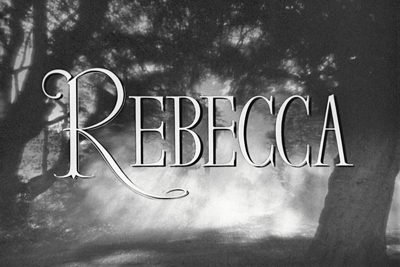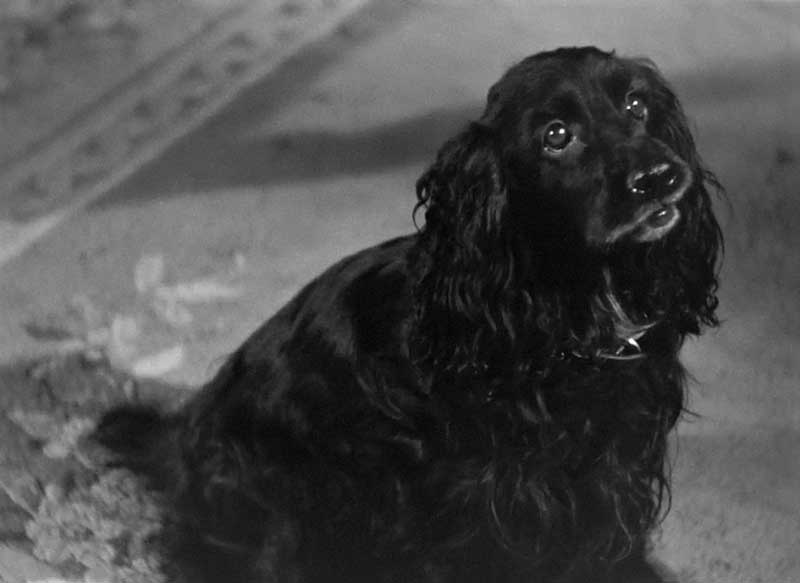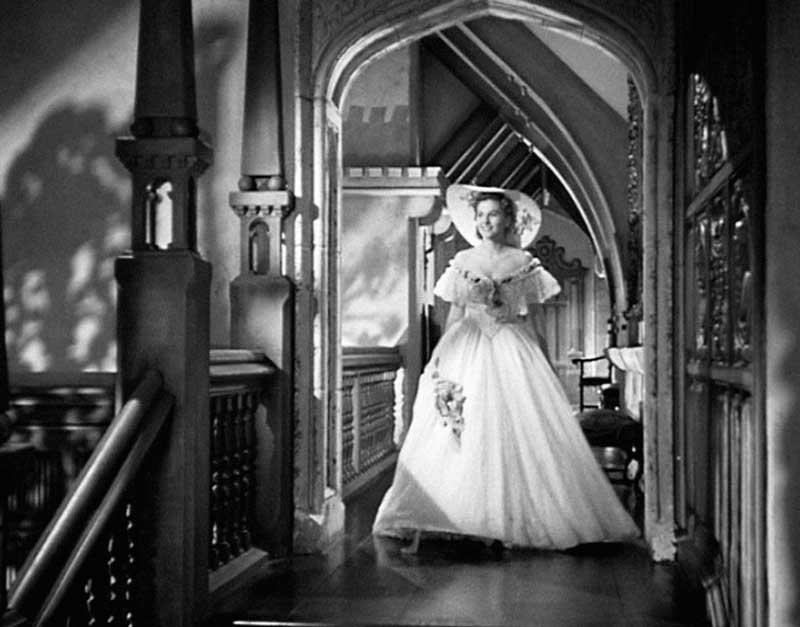
Rebecca (1940), a romantic psychological thriller, directed by Alfred Hitchcock, his first American project, is based on a dreamlike adaptation of Daphne du Maurier’s 1938 Gothic suspense novel of the same name. It is the story of a young woman who marries a brooding widower only to discover that she is confined to live in the shadow of his former wife, Rebecca, who died mysteriously several years earlier. However, it is also about the jealous, obsessed housekeeper, who rigidly rejects to accept her as the mistress of the house, which most thinly-veiled the lesbian cautionary tales of the enforcement of the censorship guidelines, popularly known as the Hays Code era of Hollywood.

The film evocatively set in the wilds of Cornwall, in a large country house called Manderley, starts in an atmosphere of apprehension, with one of the most famous opening lines ever recorded as memory, narrated by the soft and urgent voice of the unnamed heroine of the film. It deals with the pathetic and bewildered experience of the new Mrs de Winter, who before her marriage to Maximilian de Winter used to work for an elderly socialite in Monte-Carlo.
It also depicts her pain and guilt, as she was psychologically dominated by the memory and the omnipresence of the deceased first wife, Rebecca, while tormented by her blindly adoring and loyal housekeeper’s attempts to remind her of the dead woman and ends with the flaming destruction of Manderley.

Rebecca, the haunting thriller about a tortured romance, starts when a shy young woman, unnamed in the film until she is married and adopts her husband's name, meets the dashing aristocratic widower Maxim de Winter at the French Riviera, whose wife, Rebecca, drowned in a sailboat accident. The young woman, mesmerised by the charm and approach of the man, believes she has found her heart’s desire and after a whirlwind courtship, she becomes the new Mrs de Winter.
After the marriage, Maxim takes his new bride back to Manderley, his baroque ancestral mansion by the sea in southwest England, but she soon learns that the haunting memory of his deceased wife prevails and reigns all over the mansion, as well as in the temperamental, brooding Maxim. The mansion, dominated by its chilly housekeeper, Mrs Danvers, a close confidante of the first Mrs De Winter, who silently, but sternly refuses to accept the new bride to take her place. She has meticulously preserved Rebecca's grand bedroom suite as it was, prominently displaying various items that carry her monogram. Despite receiving compliments from various people, Mrs Danvers never failed to remind that Rebecca was personified glamour and gaiety and in no way she can compete with the dead paragon to win Maxim’s love, which could explain his irrational outbursts of anger.

At the annual costume ball at Manderley, Danvers intentionally persuaded the new Mrs De Winter to copy the dress that one of Maxim's ancestors is seen wearing in a portrait. She dressed as advised, not knowing it was similar to one worn by Rebecca shortly before her death and consequently, she had to face a humiliating situation. As she appeared in the costume, Maxim became shocked and irked and in the presence of the guests, rudely ordered her to change immediately.
Following the incident, when she confronted Danvers and demanded an explanation about intentionally humiliating her publicly, Danvers responded by saying that she wanted to prove that she can never take the place of Rebecca and also tried to convince that Maxim never loved her. In her desperate attempt to make her emotionally depressed, Danvers almost became successful to persuade her to jump to death from the second-floor window in Rebecca's room.

However, at that moment, rockets were set off as a ship collided with a reef in the nearby bay, due to the fog and later, the divers discovered a sunken sailing boat, containing the body of Rebecca. Under the changed circumstances, Maxim revealed to his second wife that he was never in love with Rebecca as she was a devious woman and was having numerous affairs. However, to avoid scandal, he had to accept her proposal that she would appear as the perfect wife, if he allowed her to live privately as she pleased. Nevertheless, on the night of her death, she had informed her husband that she was pregnant with the child of her cousin and lover, Jack Favell, and taunted Maxim that the estate might pass to someone other than Maxim's line. During that time, in the course of a heated argument, while Maxim was thinking to shoot Rebecca, she accidentally fell, struck her head, and died instantly. The impact made Max scared and afraid of being charged with murder, he put her body in a sailboat that he then sank. Later, when a body had been found weeks after Rebecca’s disappearance, he identified it as the body of Rebecca.


Although Maxim was seemingly saved when the coroner declares Rebecca’s death a suicide, Jack Favell alleged that she was murdered by Maximilian de Winter, as she loved him and Mrs Danvers also unflinchingly confirmed that the two were having an affair. But further investigation revealed that on the day of her death, Rebecca visited a doctor in London, who confirmed that she was infertile and dying of cancer. Consequently, it was considered that the verdict of the doctor made her determined to end her life immediately to spare herself from a long and unglamorous death. In view of the truth revealed by the physician, Maximilian was cleared of the allegation of murder. It was also considered that probably she wanted Maxim to kill her in the beach house, which would destroy him as well, so that he would not be able to enjoy his life, after her death. She, therefore, tried to provoke him with the deceitful news of pregnancy by another man and carrying a child that would someday inherit his estate. But she had stumbled accidentally and killed herself in the impact of the suicidal fall.

In the eerie and suspenseful conclusion of the film, Favell called Mrs Danvers from a phone booth to inform how her deceased mistress Rebecca had kept the truth from both of them. Mrs Danvers could not take it anymore, the imminent prospect of Maxim and his dear little bride living happily ever after at Manderley, was unbearable for her and crazed with a blind rage of jealousy, she carried a lighted candle through the darkened hallways to set Manderley on fire. While returning from London with his bride and proceeding up the long driveway to Manderley, Maxim saw the sky brightly lit by the flames of the mansion and Mrs Danvers, last seen through a West Wing window, became consumed in the blazing inferno with the memories of her beloved mistress.

Despite several celebrated actresses like Loretta Young, Margaret Sullavan, Anne Baxter and Vivien Leigh were tested for the role of the second Mrs Maxim de Winter, young Joan Fontaine bagged it and excelled in her performance. Simultaneously, although Ronald Colman was considered for the male lead role, Laurence Olivier got the final nod and superbly portrayed the mental agony of the brooding widower. However, Judith Anderson as the haunting housekeeper, Mrs Danvers, perfectly established herself as the one true Supreme in the house of Maxim de Winter with an imperious air. As intended by the director, she fondles Rebecca’s underwear with a subtle touch of lesbianism and the only time she seems happy in the entire film is when she recalled helping Rebecca undress after she would come home late from a party. In the film’s most sexually charged scene, she delicately exposed her attitude, carefully adhering to the Hays Code, as she picks up Rebecca’s lacy negligee, displaying its transparency.

The legendary version of the film, created by Alfred Hitchcock and captured in stunning black and white by George Barnes, was released on 12 April 1940 and proved to be a critical and commercial success. Although the film slightly deviated from the novel, as Maxim instead of shooting Rebecca, only thought of killing her, it earned eleven nominations at the Academy Awards, more than any other film that year and own two for best picture and best cinematography. Its nomination in nine other categories included the Best Actor (Laurence Olivier), Best Actress (Joan Fontaine), Best Supporting Actress (Judith Anderson) and Best Director, which was Hitchcock's first nomination in this category. In 2018, Rebecca (1940) was selected for preservation as being culturally, historically or aesthetically significant in the United States National Film Registry by the Library of Congress.